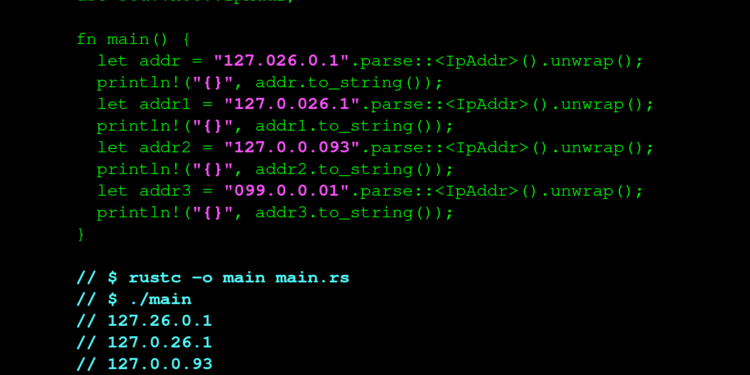Title
CVE-2021-29922 rust standard library “net” – Improper Input Validation of octal literals in rust 1.52.0 std::net and below results in indeterminate SSRF & RFI vulnerabilities.
CVE ID
CVE-2021-29922
CVSS Score
9.1
CVSS:3.1/AV:N/AC:L/PR:N/UI:N/S:U/C:N/I:H/A:H
Internal ID
SICK-2021-015
Vendor
rust-lang
Product
rust std::net
Product Versions
1.52.1 and below
Vulnerability Details
Improper input validation of octal strings in rust-lang standard library “net” allows unauthenticated remote attackers to perform indeterminate SSRF, RFI, and LFI attacks on many programs that rely on rust-lang std::net. IP address octects are left stripped instead of evaluated as valid IP addresses. For example, an attacker submitting an IP address to a web application that relies on std::net::IpAddr, could cause SSRF via inputting octal input data; An attacker can submit exploitable IP addresses if the octet is 3 digits, with the minimum exploitable octect being 08 (Denial of Service) and the maximum exploitable octet is 099 (Denial of Service). For example, an attacker can submit 010.8.8.8, which is 8.8.8.8 (RFI), yet std::net::IpAddr will evaluate this as 10.8.8.8. Equally, an attacker can input 127.0.026.1 which is really 127.0.22.1 but rust evaluates it as 127.0.26.1.
Vendor Response
Fixed in rust 1.53: https://github.com/rust-lang/rust/pull/83652
Proofs of Concept
#!/bin/bash
# Authors: https://github.com/sickcodes, https://twitter.com/sickcodes
# https://doc.rust-lang.org/std/net/struct.Ipv4Addr.html#method.is_private
# License: GPLv3+
# https://play.rust-lang.org/?version=stable&mode=release&edition=2015&gist=62f6f98dc1de7d162ee4e62d09825035
cat <<EOF>poc.rs
#![allow(unused)]
fn main() {
use std::net::Ipv4Addr;
let localhost = Ipv4Addr::new(127, 0, 0, 1);
assert_eq!("0127.0.0.1".parse(), Ok(localhost));
assert_eq!(localhost.is_loopback(), true);
}
EOF
# vulnerable
docker run -it -v ~/poc.rs:/poc.rs rust:1.51 /bin/bash -c "rustc -V; rustc /poc.rs; ./poc && echo VULNERABLE"
# vulnerable
docker run -it -v ~/poc.rs:/poc.rs rust:1.52 /bin/bash -c "rustc -V; rustc /poc.rs; ./poc && echo VULNERABLE"
# fixed
docker run -it -v ~/poc.rs:/poc.rs rust:1.53 /bin/bash -c "rustc -V; rustc /poc.rs; ./poc && echo VULNERABLE"
# fixed
docker run -it -v ~/poc.rs:/poc.rs rust:1.54 /bin/bash -c "rustc -V; rustc /poc.rs; ./poc && echo VULNERABLE"
# fixed
docker run -it -v ~/poc.rs:/poc.rs rust:1.58 /bin/bash -c "rustc -V; rustc /poc.rs; ./poc && echo VULNERABLE"// ##!/usr/bin/env rustc
// # Authors: https://twitter.com/sickcodes, https://twitter.com/kaoudis
// # License: GPLv3+
use std::net::IpAddr;
fn main() {
let addr = "127.026.0.1".parse::<IpAddr>().unwrap();
println!("{}", addr.to_string());
let addr1 = "127.0.026.1".parse::<IpAddr>().unwrap();
println!("{}", addr1.to_string());
let addr2 = "127.0.0.093".parse::<IpAddr>().unwrap();
println!("{}", addr2.to_string());
let addr3 = "099.0.0.01".parse::<IpAddr>().unwrap();
println!("{}", addr3.to_string());
}
// $ rustc -o main main.rs
// $ ./main
// 127.26.0.1
// 127.0.26.1
// 127.0.0.93
// 99.0.0.1Disclosure Timeline
- 2021-03-29 – Researchers discover vulnerability
- 2021-03-29 – CVE requested
- 2021-03-30 – Fix merged in master https://github.com/rust-lang/rust/pull/83652
- 2021-08-07 – Release @ DEF CON 29 https://www.youtube.com/watch?v=_o1RPJAe4kU
Links
https://github.com/rust-lang/rust/issues/83648
https://github.com/rust-lang/rust/pull/83652
https://doc.rust-lang.org/beta/std/net/struct.Ipv4Addr.html
https://github.com/sickcodes/security/blob/master/advisories/SICK-2021-015.md
https://sick.codes/sick-2021-015
https://www.youtube.com/watch?v=_o1RPJAe4kU
https://defcon.org/html/defcon-29/dc-29-speakers.html#kaoudis
Researchers
Cheng Xu: https://github.com/xu-cheng || https://xuc.me/
Victor Viale: https://github.com/koroeskohr || https://twitter.com/koroeskohr
Sick Codes: https://github.com/sickcodes || https://twitter.com/sickcodes
Kelly Kaoudis: https://github.com/kaoudis || https://twitter.com/kaoudis
John Jackson: https://github.com/johnjhacking || https://www.twitter.com/johnjhacking
Nick Sahler: https://github.com/nicksahler || https://twitter.com/tensor_bodega
CVE Links
https://sick.codes/sick-2021-015
https://cve.mitre.org/cgi-bin/cvename.cgi?name=CVE-2021-29922





I don’t see how this can be an error and even get a cve number.
Today there are two dominant implementations of the ip format – IETF and BSD.
The “0 for octal” format is something BSD proposed but it has not been widely adopted. Ietf on the other hand, say that e.g. 026 is actually 26.
The general consensus these days is to simply not allow octal format with 0 or hexadecimal format with 0x.
Thanks for your comment, Kim.
The consensus is there, but the languages allowed it, unfortunately.
Here are some examples of the impact:
CVE-2021-33571 – In Django 2.2 before 2.2.24, 3.x before 3.1.12, and 3.2 before 3.2.4, URLValidator, validate_ipv4_address, and validate_ipv46_address do not prohibit leading zero characters in octal literals. This may allow a bypass of access control that is based on IP addresses. (validate_ipv4_address and validate_ipv46_address are unaffected with Python 3.9.5+..) .
CVE-2019-12161 – CVE-2019-12161 WPO WebPageTest 19.04 allows SSRF because ValidateURL in www/runtest.php does not consider octal encoding of IP addresses (such as 0300.0250 as a replacement for 192.168).
CVE-2016-4029 – WordPress before 4.5 does not consider octal and hexadecimal IP address formats when determining an intranet address, which allows remote attackers to bypass an intended SSRF protection mechanism via a crafted address.
Since we can’t read everyone’s codebases, how else other than a CVE advisory would we detail the vulnerability?